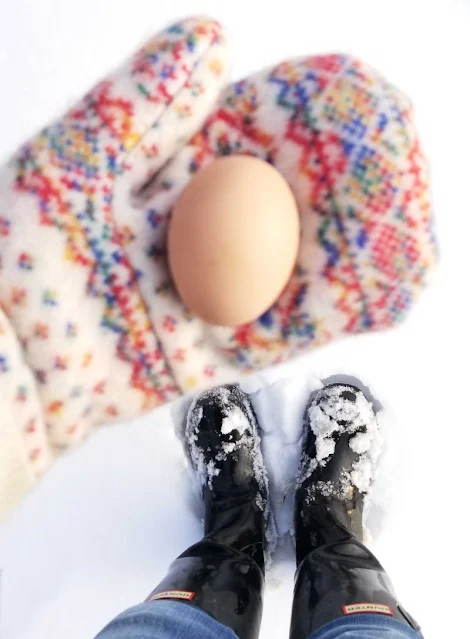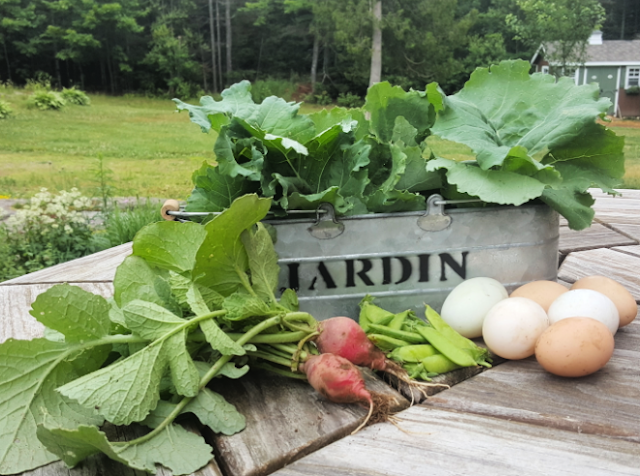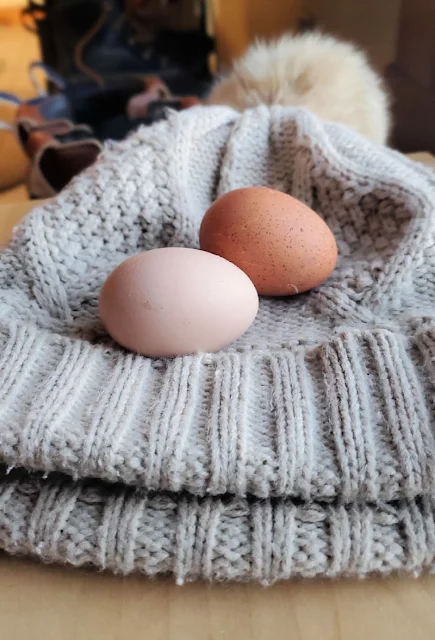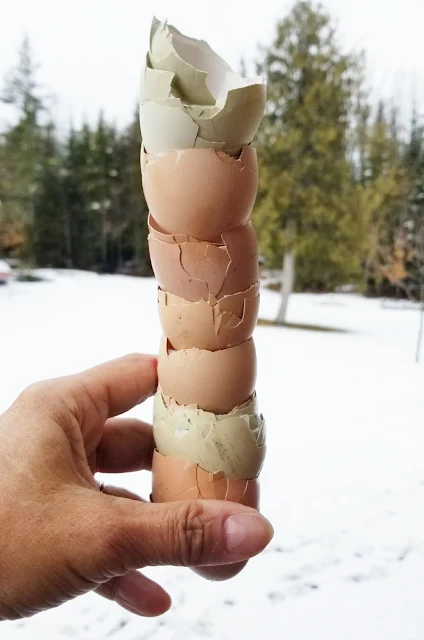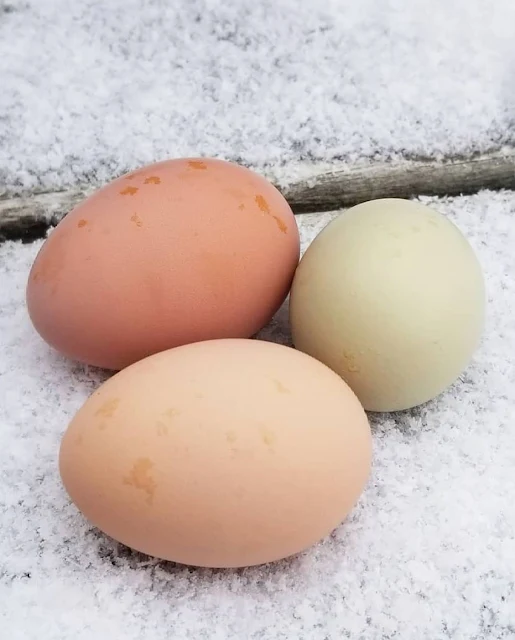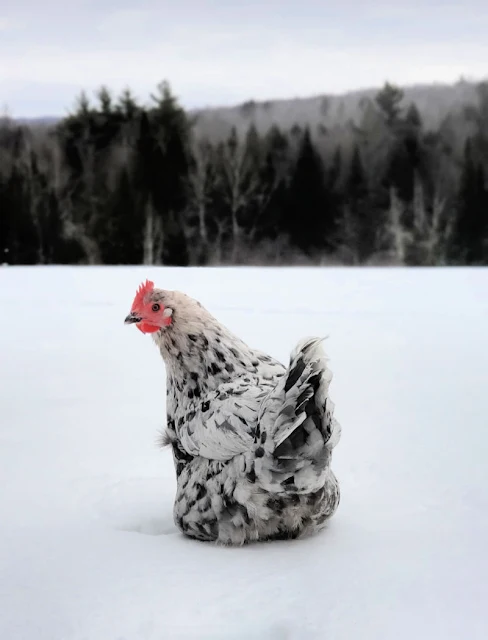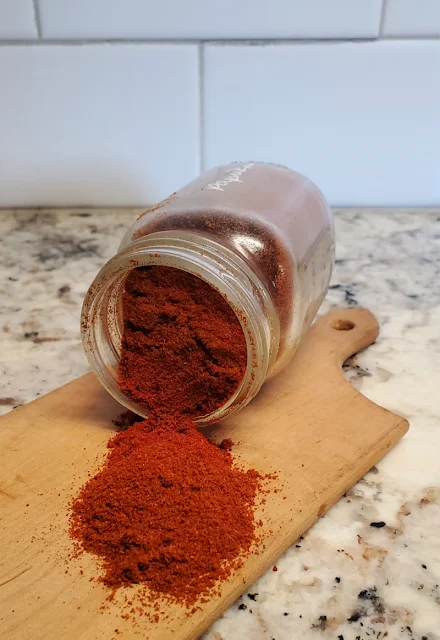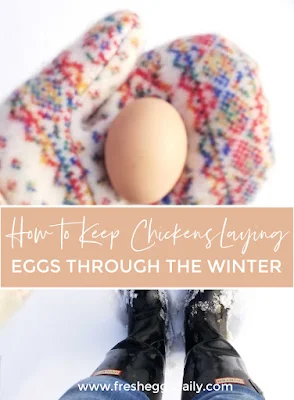Chickens naturally slow down or stop laying eggs as the days get shorter, but using these few simple tricks, you can keep the eggs coming all winter long.
One of the things about raising backyard chickens that surprises those just getting started with their flock is that chickens don't generally lay all year long.
We get so used to seeing eggs in cartons piled in stacks at the grocery store year round, that we forget that technically eggs are a "seasonal" crop just like the fruits and vegetables we grow in our gardens.
The shorter days and cooler temperatures signal to hens to take a break and give their bodies a rest.
Chicken need several things to really thrive and lay at their optimal production rate:
- a diet consisting mainly of well-balanced layer feed
- a minimum of 12 hours of daylight (and closer to 16 or 17 is optimal) to stimulate their ovaries to release a yolk and begin the egg laying process.
The declining daylight hours send an intentional signal sent to the hens to stop laying eggs because baby chicks (at least living out in the wild) likely wouldn't survive if they're born in the middle of the winter.
So it's Mother Nature's way of making sure the chickens lay eggs during the times of year when it makes sense to be raising their young.
Handling a Reduction in Egg Production
So as the days get shorter heading into fall, egg production will naturally start to slow down. Personally, I am okay with that. I prefer to let nature take its course and let my girls take a break through the winter. By managing what eggs we do have, I've learned how to get through the winter without too much hardship.
Fresh, unwashed eggs will last at least 3 months in the refrigerator, so the last eggs of the season usually hold me over until at least January. I also set aside extra eggs in the freezer to use for my holiday baking, and then we eat a lot of oatmeal for breakfast in the winter!
Come spring, my girls are rested and ready to start laying again. Usually by late February my hens will resume egg production.
But what about if you absolutely positively are determined to keep egg production going strong year round? Well there are a few things you can try to keep your chickens laying eggs through the winter.
How to Keep your Chickens Laying Eggs Through the Winter
First and foremost it's important to keep your chickens as healthy as possible if you expect them to lay eggs year round. Laying eggs takes a lot out of them.
They funnel nutrients, vitamins and minerals in the foods they eat right into their eggs, so if you are going to expect eggs year round, you'll need to be sure your chickens have a balanced diet. This consists of:
- access to fresh, clean (unfrozen) water
Protein, Calcium and Hydration for Laying Hens
Protein Needs for Laying Hens
An egg is about 15% protein, so adding some extra protein to your flock's diet in the winter isn't a bad idea during the cold months when your chickens are using extra energy to stay warm.
Some good sources of added protein are:
- A layer feed with added protein
Extra protein in the fall and early winter can also help them get through the fall molting season more quickly and get back to the business of laying eggs.
Calcium Needs for Laying Hens
You'll also need to be sure your hens have a constant supply of free-choice calcium. They need plenty of calcium to form nice strong eggshells on the eggs they lay and also to create the contractions to actually lay the egg.
Either crushed oyster shell or eggshells work. Without enough calcium to support the eggs they're laying, they could start laying soft-shelled eggs or start leaching the calcium from their bones, making them more susceptible to leg issues or broken bones. And you don't want that.
I air dry and crush up all the eggshells for my chickens, but also leave a small dispenser in the coop filled with oyster shell as a backup.Water Needs for Laying Hens
Eggs are about 75% water, so even a few hours without water can cause a reduction in egg production, so fresh water each morning and making sure it's refreshed and refilled (and not frozen!) throughout the day is important always - but especially if you're expecting eggs through the winter.
Once you've got your hens in tip-top shape, you can try these simple ideas to keep your chickens laying eggs through the winter:
How to Keep your Chickens Laying Eggs Through the Winter
Artificial Light in your Chicken Coop
The single-most important thing you need to do if you want eggs from your chickens through the winter is to add light to your chicken coop. A regular light bulb will provide the light they need to trick them into laying. It doesn't need to be bright. It just needs to provide enough light so that you can see your hand in front of your face once the sun goes down.
Be sure the light fixture is securely fastened so it won't fall and cause a fire and be sure to check the bulb often throughout the winter. If the bulb burns out, your chickens will think days are getting shorter again and it could throw them into a spontaneous molt - which is the last thing you want in the middle of the winter!
Put the Light on a Timer
The best way to light your coop through the winter is to put the bulb on a timer that goes on early in the morning to provide the extra hours of daylight so your chickens are getting the 14 or 16 hours they need. This way your chickens will wake up early, instead of the hours being added in the evening and the light suddenly switching off and leaving your poor hens plunged into darkness!
Since they will be woken up likely well before you are ready to let them out, tossing some grains on the floor of the coop the night before for them to find once the sun rises should keep them busy and not pecking at each other until you let them out to eat their breakfast.
As I mentioned above, I am not a fan of lighting my coop to force my hens to lay. I think they need a break after a long laying season and the fall molting season. I'm okay with letting nature take its course.
But if you must add artificial light, then following these guidelines will be most effective and safe.
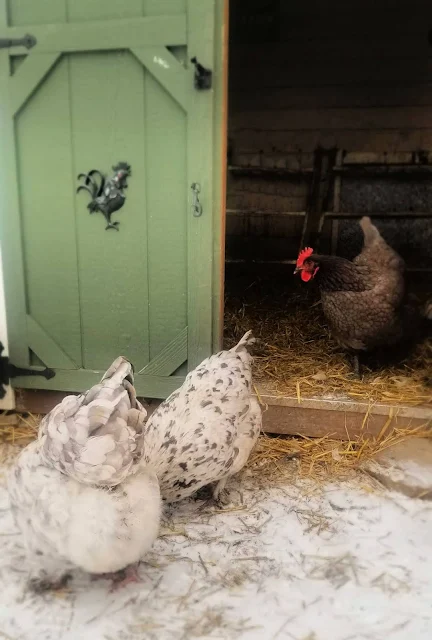
A Bit of Warmth in your Chicken Coop
I am absolutely not a fan of heating chicken coops. Chickens don't need heat in the overwhelming number of cases, and heat lamps are a huge fire hazard. And anyway, it's not technically the cold that slows down egg production - it's the lack of daylight hours.
But keeping your chickens a bit warmer could encourage them to lay eggs in the cold months. If they aren't having to expend extra energy to stay warm, they are more likely to put that energy in to laying eggs. But instead of a heat lamp, try the Deep Litter Method to create a bit of natural warmth in the coop - safely.
Choose your Breeds Carefully
Some breeds have been bred to lay well year round. The "production breeds" such as Red Star, Golden Comet and Sex Links tend to lay no matter what the temperature or length of day. So if eggs year round are important to you, choosing these breeds for your flock is a good idea.
On the flip side, however, I believe that these "production" breeds tend to suffer more reproductive issues such as egg binding, vertical prolapse and ovarian cancer.
I personally prefer the so-called heritage breeds, and if you choose those breeds that are more cold-hardy, you should have good luck with them laying for you in a lighted coop.
Good choices for breeds that might lay better through the winter include:
Maybe Consider Ducks
If eggs are important to you year round, maybe consider raising some ducks? Our ducks consistently outlay our chickens, continuing to lay through the winter without any supplemental light.
Another nice thing about duck is that they usually lay their eggs just before sunrise. Then they cover them up with straw from their nests. In more than a decade of raising ducks, I have never found a frozen duck egg.
Now, frozen chicken eggs are another story!
Add a Few Chicks each Spring
Because I'm not a fan of adding heat or light to my coop, and I chose to raise heritage breeds instead of the winter-producing production breeds, but I still do love those farm fresh eggs year round, I have found the best way to ensure production stays steady through the winter.
Add some chicks each spring! These new layers will start up in late fall, likely just about the time your older hens slow down for molting season, and continue to lay right through until the following spring - with no supplemental light or heat required.
Farm families since the beginning of time have used this method, likely well before electricity even existed. By adding chicks to the flock each spring, the hens go on to be the winter layers their first year (and the roosters would go in the freezer to feed the family through the winter).
Sprinkle some Cayenne Pepper?
One thing that likely isn't going to help with egg production is adding cayenne pepper to your chicken feed.
Despite claims that this old-timers method really works making the rounds on the internet each winter, and chicken keepers claiming year after year that they fed their chickens cayenne pepper and miraculously they started seeing eggs again, I could only find one sort-of reputable source that claimed this was true, and then lots of unsubstantiated chatter in various forums and chat groups.
However, there's no harm in trying. Chickens lack the taste receptor for "hot" or "spicy", so the heat of the cayenne won't bother them. And even if you don't see more eggs, the xanthophyll in the cayenne pepper will result in vibrant orange egg yolks.
And the cayenne will also help circulation. The capsaicin in the cayenne pepper aids in blood circulation, which can help to prevent frostbite.
In summary, there are a few things you can try to keep your chickens laying through the winter if you absolutely, positively can't go without eggs ... or your can choose to give your hens a well-deserved break like I do and look forward to nests full of warm, fresh eggs come spring. While you eat oatmeal for breakfast all winter long!
Pin This!
 Facebook | Twitter | Instagram | YouTube | Subscribe
©2021 by Fresh Eggs Daily, Inc. All rights reserved
Facebook | Twitter | Instagram | YouTube | Subscribe
©2021 by Fresh Eggs Daily, Inc. All rights reserved




